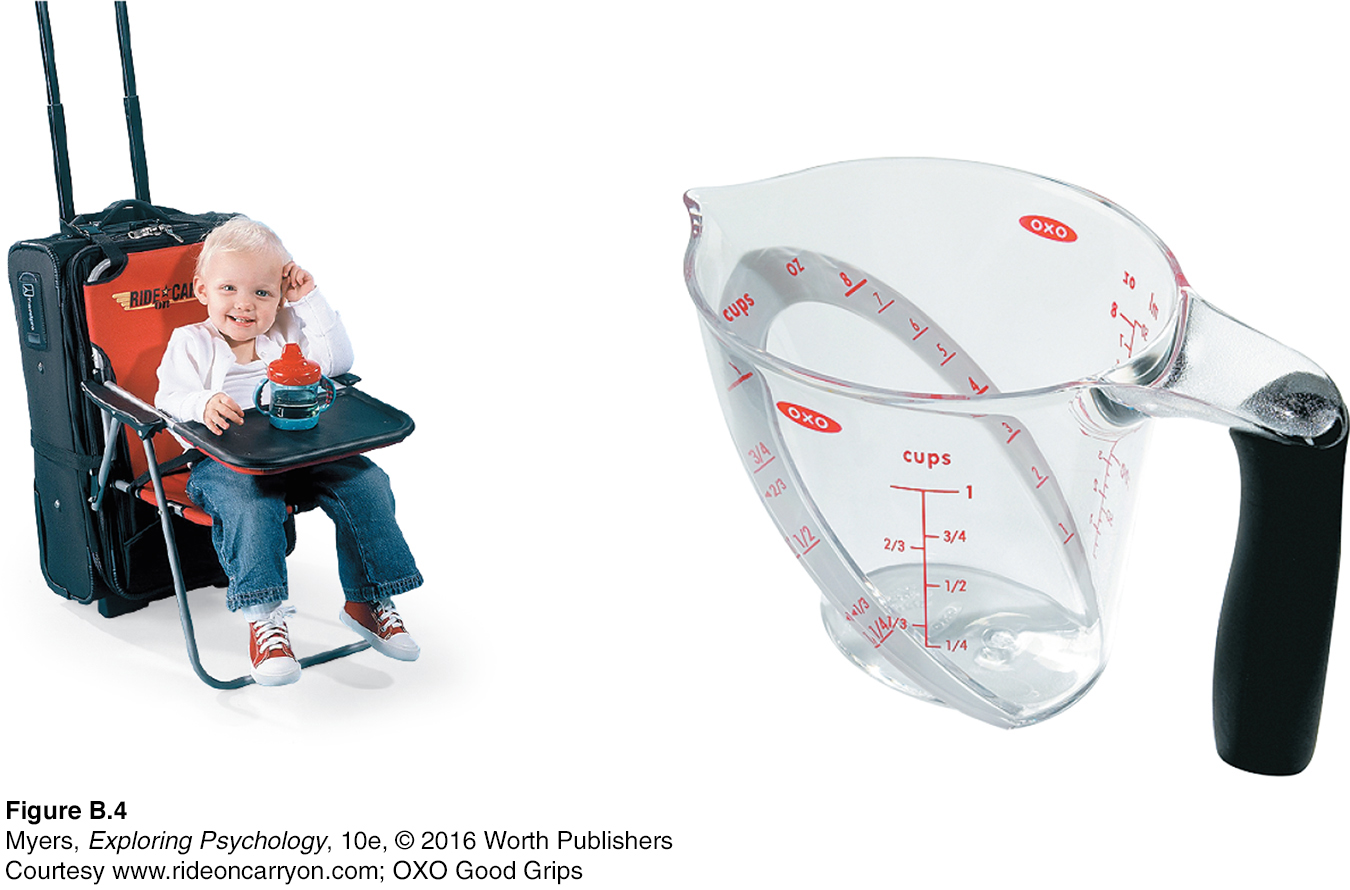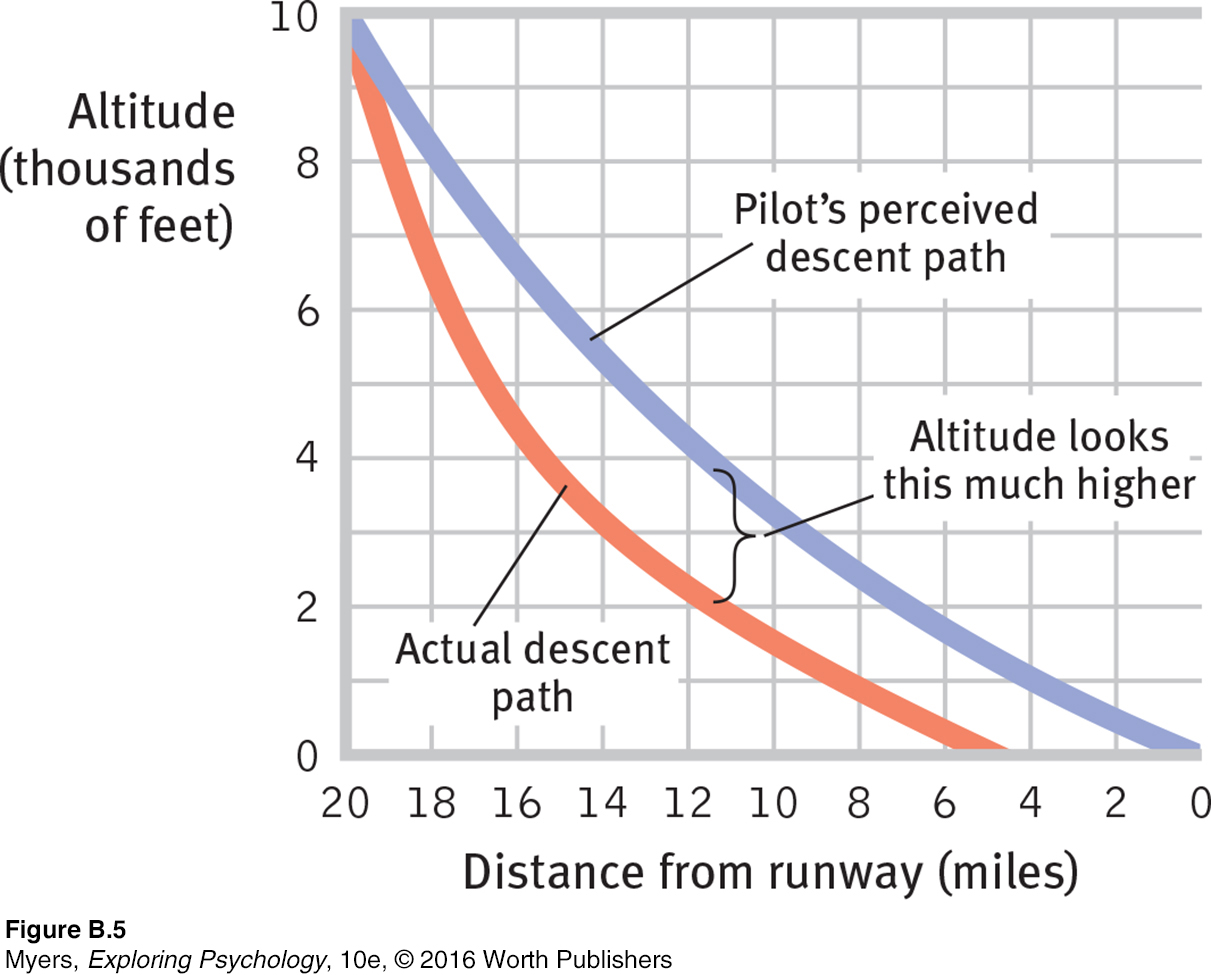The Human Factor
B-
Designs sometimes neglect the human factor. Psychologist Donald Norman bemoaned the complexity of assembling his new HDTV, related components, and seven remotes into a usable home theater system: “I was VP of Advanced Technology at Apple. I can program dozens of computers in dozens of languages. I understand television, really, I do. . . . It doesn’t matter: I am overwhelmed.”
How much easier life might be if engineers would routinely test their designs and instructions on real people. Human factors psychologists work with designers and engineers to tailor appliances, machines, and work settings to our natural perceptions and inclinations. Bank ATM machines are internally more complex than remote controls ever were, yet, thanks to human factors engineering, ATMs are easier to operate. Digital recorders have solved the TV recording problem with a simple select-
Norman (2001) hosts a website (www.jnd.org) that illustrates good designs that fit people (FIGURE B.4). Human factors psychologists also help design efficient environments. An ideal kitchen layout, researchers have found, puts needed items close to their usage point and near eye level. It locates work areas to enable doing tasks in order, such as placing the refrigerator, stove, and sink in a triangle. It creates counters that enable hands to work at or slightly below elbow height (Boehm-

Understanding human factors can help prevent accidents. By studying the human factor in driving accidents, psychologists seek to devise ways to reduce the distractions, fatigue, and inattention that contribute to 1.3 million annual worldwide traffic fatalities (Lee, 2008). After beginning commercial flights in the 1960s, the Boeing 727 was involved in several landing accidents caused by pilot error. Psychologist Conrad Kraft (1978) noted a common setting for these accidents: All took place at night, and all involved landing short of the runway after crossing a dark stretch of water or unilluminated ground. Kraft reasoned that, on rising terrain, city lights beyond the runway would project a larger retinal image, making the ground seem farther away than it was. By re-

Human factors psychologists can also help us to function in other settings. Consider the available assistive listening technologies in various theaters, auditoriums, and places of worship. One technology, commonly available in the United States, requires a headset attached to a pocket-
Designs that enable safe, easy, and effective interactions between people and technology often seem obvious after the fact. Why, then, aren’t they more common? Technology developers sometimes mistakenly assume that others share their expertise—
“The better you know something, the less you remember about how hard it was to learn.”
Psychologist Steven Pinker, The Sense of Style, 2014
The point to remember: Everyone benefits when designers and engineers tailor machines and environments to fit human abilities and behaviors, when they user-
RETRIEVE IT
Question
Name two main divisions of industrial-

REVIEW Psychology at Work
Learning Objectives
Test Yourself by taking a moment to answer each of these Learning Objective Questions (repeated here from within the Appendix). Research suggests that trying to answer these questions on your own will improve your long-
Question
B-
Question
B-
Question
B-
Question
B-
Question
B-
Terms and Concepts to Remember
Test yourself on these terms.
Question
flow (p. B- industrial- personnel psychology (p. B- organizational psychology (p. B- human factors psychology (p. B- structured interview (p. B- task leadership (p. B- social leadership (p. B- | group- interview process that asks the same job- an I/O psychology subfield that examines organizational influences on worker satisfaction and productivity and facilitates organizational change. the application of psychological concepts and methods to optimizing human behavior in workplaces. a completely involved, focused state of consciousness, with diminished awareness of self and time, resulting from optimal engagement of one's skills. goal- an I/O psychology subfield that helps with job seeking, and with employee recruitment, selection, placement, training, appraisal, and development. a field of psychology allied with I/O psychology that explores how people and machines interact and how machines and physical environments can be made safe and easy to use. |
Experience the Testing Effect
Test yourself repeatedly throughout your studies. This will not only help you figure out what you know and don’t know; the testing itself will help you learn and remember the information more effectively thanks to the testing effect.
Question 17.1
1. People who view their work as a calling often experience ________, a focused state of consciousness, with diminished awareness of themselves and of time.
| A. |
| B. |
| C. |
| D. |
Question 17.2
2. psychologists study the recruitment, selection, placement, training, appraisal, and development of employees; psychologists focus on how people and machines interact, and on optimizing devices and work environments.
Question 17.3
3. A personnel psychologist scripted a set of questions to ask all applicants for a job opening. She then trained the firm's interviewers to ask only these questions, to take notes, and to rate applicants' responses. This technique is known as a(n)
| A. |
| B. |
| C. |
| D. |
Question 17.4
4. In your job, you rate your own performance, your manager's, and your peers'. Your manager, your peers, and your customers also rate your performance. Your organization is using a form of performance appraisal called
| A. |
| B. |
| C. |
| D. |
Question 17.5
5. What type of goals will best help you stay focused and motivated to do your best work in this class?
Question 17.6
6. Research indicates that women are more likely than men to have a leadership style.
Question 17.7
7. Effective managers often exhibit
| A. |
| B. |
| C. |
| D. |
Question 17.8
8. To reduce users' frustration and to avoid accidents, human factors psychologists help organizations avoid the curse of knowledge, which is the tendency for
| A. |
| B. |
| C. |
| D. |
Use  to create your personalized study plan, which will direct you to the resources that will help you most in
to create your personalized study plan, which will direct you to the resources that will help you most in  .
.